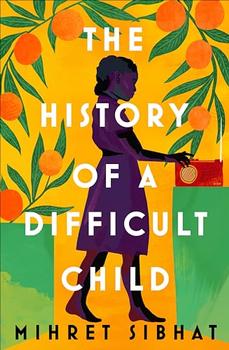Summary | Excerpt | Reading Guide | Reviews | Beyond the Book | Read-Alikes | Genres & Themes | Author Bio

A Novel
by Mihret SibhatThis article relates to The History of a Difficult Child
 In The History of a Difficult Child, the Asmelash family turns to the radio for news about Ethiopia's revolutionary government, the Derg, which formed in 1974: they listen to reports about the famine in northern Ethiopia, charges by Human Rights International of human rights abuses by Chairman Mengistu, and, as the years pass, updates about progress that guerrilla groups make against the People's Democratic Republic of Ethiopia (PDRE; the new name for the Derg beginning in 1987).
In The History of a Difficult Child, the Asmelash family turns to the radio for news about Ethiopia's revolutionary government, the Derg, which formed in 1974: they listen to reports about the famine in northern Ethiopia, charges by Human Rights International of human rights abuses by Chairman Mengistu, and, as the years pass, updates about progress that guerrilla groups make against the People's Democratic Republic of Ethiopia (PDRE; the new name for the Derg beginning in 1987).
Mengistu's PDRE was felled by a combination of separatist guerilla groups, all waging warfare against the government with the goal of independence. One of the most crucial was the Eritrean People's Liberation Front (EPLF). At the time, Eritrea was a purportedly autonomous state within Ethiopia (the two states together were known as the Ethiopian–Eritrean Federation). An Eritrean independence movement had been organizing since the 1960s, even before the Derg took power. By 1977, the EPLF seemed close to driving the Ethiopians out of Eritrea, but the Soviet Union assisted Ethiopia and forced the EPLF to retreat; fighting continued for another decade, until the EPLF's major victory in capturing Afabet, the Ethiopian Army headquarters in Northwestern Eritrea.
In early 1988, the EPLF began to coordinate its attacks with the Tigray People's Liberation Front (TPLF), another powerful liberation movement that had long been fighting Ethiopia for the autonomy of Tigray (the region just south of Eritrea) and for splitting Ethiopia up into autonomous regions based on ethnicity. Emboldened by the Soviets' discontinuation of their support, the TPLF organized the Ethiopian People's Revolutionary Democratic Front (EPRDF), which was largely Amhara (one of the two largest ethnolinguistic groups in Ethiopia, along with the Oromo), and advanced further into Ethiopia. Finally, these actions spurred the long-dormant Oromo Liberation Front (OLF) into action. These liberation movements took increasing control over Ethiopia's land and eventually advanced to the capital, Addis Ababa.
As Eritrea claimed victory over Ethiopia (independence would be officially proclaimed in 1993), the EPRDF took power over the state government. However, the overthrow of Mengistu did not result in instantaneous democracy. In 1991, the EPRDF (which was dominated by one ethnic group party, the TPLF) set up a transitional government, but soon consolidated its power and, due to its military strength, dominated the political landscape, with no other real alternative choices for the electorate. This new federal government instated the constitutional right of secession for the 80+ ethnic groups in Ethiopia. In 2001, ten years after the EPRDF took power, a scholar from Western Michigan University's Center for African Development Policy Research reported that the party's policy of allowing ethnic groups to form their own states, "ostensibly meant to draw support and legitimacy from the numerous ethnic groups for the TPLF, has only served to expedite the emergence of another wave of ethnic conflicts, besides leaving the entire multiethnic, multilingual, multi-religious population in a state of confusion." And 30 years after they took power, conflict among the different ethnic groups continues to rage.
Map of Eritrea and Ethiopia, courtesy of MarginalCost (CC BY-SA 4.0)
Filed under People, Eras & Events
![]() This article relates to The History of a Difficult Child.
It first ran in the August 23, 2023
issue of BookBrowse Recommends.
This article relates to The History of a Difficult Child.
It first ran in the August 23, 2023
issue of BookBrowse Recommends.
Your guide toexceptional books
BookBrowse seeks out and recommends the best in contemporary fiction and nonfiction—books that not only engage and entertain but also deepen our understanding of ourselves and the world around us.